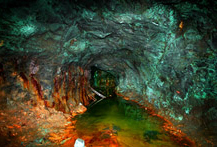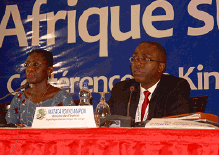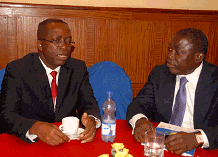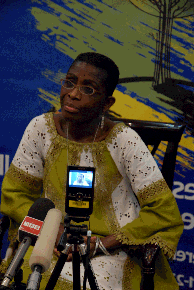
Typical street scene in Santa Ana, El Salvador. (Photo: iStock)
IMF Survey: Natural Resources Can Spur Growth But Need Good Management
March 30, 2012
- Kinshasa conference part of IMF’s heightened focus on natural resource management
- Management of natural resource revenue poses significant economic challenges
- Requires appropriate tax policies, fairer and more equitable contracts, and strengthened revenue administration
Natural resources have been a mixed blessing for developing countries in the past. But, when managed well they can spur growth, boost jobs and revenues, and raise living standards more broadly, delegates at a conference in Kinshasa said.

Copper mine in Kinsenda, Democratic Republic of Congo: Africa needs to develop stronger management of natural resources (photo: Olivier Polet/Corbis).
Kinshasa conference
Participants from more than 20 countries underlined the importance of taking advantage of the current high commodity prices to strengthen public financial management so as to scale up investment efficiently and establish the basis for broad-based and sustained economic growth.

Matata Ponyo Mapon (r) opens the conference with Antoinette Sayeh (photo: Guy Debosscher )
“Good management of natural resources in Africa is of vital importance for ensuring that this endowment benefits all Africans,” said Matata Ponyo Mapon, Minister of Finance of the Democratic Republic of Congo, which hosted the March 21-22 conference with the IMF. He contrasted the riches of some countries with the extreme poverty of some of their citizens.
“We must use our combined knowledge to find ways to turn substantial resource assets into greater economic welfare,” Antoinette Sayeh, Director of the IMF’s African Department, stated at the start of the conference.
Modest contribution

Minister Matata with Gilbert Ondongo , Minister of Finance for Congo-Brazzaville (photo: Guy Debosscher)
Delegates, noting that oil, mining, and other extractive industries often contribute relatively modestly to public revenues, agreed that reviewing tax policies and strengthening revenue administration are important objectives for natural resource producers. They welcomed the increased focus of technical assistance in this area, including from the International Monetary Fund.
The conference on the “Management of Natural Resources in Sub-Saharan Africa” brought together about 200 policymakers, leading academics, the private sector, civil society organizations, central banks officials, and the media from across sub-Saharan Africa as part of a consultation process launched by the IMF to gather ideas about the best use of natural resources for boosting living standards in developing countries.
The IMF is seeking views on the best ways to tax natural resources, and how to use the money earned to boost standards of living in the countries that own them.
Better management
Participants agreed that the management of natural resource revenue posed significant economic challenges, including dealing with commodity price volatility and limited economic diversification and job creation.
They underlined the importance of strengthening the management of natural resource wealth to promote more rapid, sustainable, and inclusive economic growth in the continent.
Sayeh noted that the extraction of natural resources – oil, gas, and minerals – now plays an important role, adding that in almost half of the countries in sub-Saharan Africa, non-renewable natural resources account for over 25 percent of total exports.
She highlighted the increasing evidence that extraction of natural resources and the commodity price boom have fostered economic growth in sub-Saharan Africa over the past decade. For every year—except 2009— natural resource exporters have grown at a fast pace, and existing data confirm that living standards, social service provision, and institutional quality are rising among resource exporters.”
“But, as all of us know, such endowments can be a mixed blessing,” Sayeh said. “Whether one talks of the resource curse or the paradox of plenty, the message is the same: there are massive challenges to be faced in ensuring that resource wealth contributes in a sustained and inclusive manner to growth and higher living standards for all.”

Sayeh interviewed by the BBC (photo: Guy Debosscher )
Need for transparency
Participants agreed that good governance and transparency are critical for ensuring that all stakeholders – investors, governments, and others—feel that they get a fair share. Sound public financial management is also essential to make sure that public spending is efficient and that investment is directed toward strengthening critical public infrastructure and basic social services.
Many participants made a strong case for sub-Saharan African countries, confronted with pressing needs for better infrastructure and basic social services, to spend resources now rather than saving the bulk of the wealth for future generations. However, participants noted that scaling up investment in the short term required increasing absorptive capacity—what economist Paul Collier referred to as “to invest in investing.”
Overall, the conference ended on a note of optimism. Natural resource wealth presents many African countries with an opportunity to spur economic development and poverty reduction. Strengthening the management of natural resources is an important part of seizing this opportunity.


